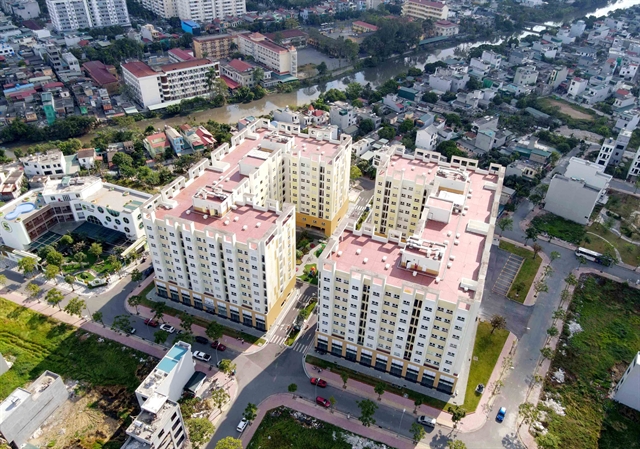A new draft resolution proposes some special elements such as establishing a national social housing fund from the State Budget and other sources, exempting such housing from investment policy approval and allowing investors to enjoy a maximum profit of 13 per cent of the total construction investment cost.

HÀ NỘI — The Ministry of Construction has recently announced a draft resolution on piloting a special mechanism for developing social housing, to speed up progress and complete the legal framework.
This is an important and necessary policy in the context of many people struggling when the price of housing exceeds their financial capacity.
The draft resolution, currently under consultation, is expected to be submitted to the National Assembly in the upcoming session.
It contains some specific elements, including establishing a national social housing fund from the State Budget and other sources, exempting such housing from investment policy approval, allowing investors to enjoy a maximum profit of 13 per cent of the total construction investment cost and supporting land funds, site clearance and infrastructure development.
Vice general director of BIC Việt Nam Company Lê Quang Huy said that the mechanism was meaningful and would allow localities to appoint investors without bidding.
This would help shorten approval process and give priority to businesses who have experience in the sector and the financial ability to rapidly increase supply of social houses, Huy told nguoiduatin.vn.
The policy of supporting land fund and site clearance was expected to lift existing difficulties and shortcomings to accelerate projects.
“With nearly 17 years of experience in developing low-cost housing, I found that the draft resolution has many breakthroughs, helping remove hurdles, increase investment attraction and improve the State’s social housing policy,” said Huy.
However, Huy also pointed out some legal hurdles that could negatively affect the feasibility of the resolution, especially the regulation on allocated land fund limitation, without bidding.
Allocating land fund just applied to projects already in the planning system would limit supply, while many localities had not proactively planned separate land funds for social housing, Huy said.
This would make it difficult for businesses to propose locations that are suitable for the general planning, because they would have to go through additional procedures to the local housing development program, which takes a lot of time, he said.
To overcome the shortcomings, he suggested that localities need to complete and publicise plans of social housing development so as to create conditions for businesses to invest in projects as well as more flexible mechanism in approving the projects initiated by the State that help increase supply of social homes.
Many businesses expected that when the resolution takes effect the bigger cities, such as the capital Hà Nội and HCM City, social housing will reach the target of development assigned by the Prime Minister and contribute to fulfilling the project of one million social houses by 2030.
Meanwhile, former director of the Central Institute for Economics Management (CIEM) Dr Võ Trí Thành, said while the establishment of the national land fund could help millions of people own their own homes, in the context of continuously increasing real estate prices in big cities, it would still be difficult for low-income people to access commercial housing.
"The fund is not only to assist people buy houses at reasonable prices but also contribute to regulate real estate market, curb speculation and promote sustainable economic development," Thành said.
The State should play a central role in establishing, managing and operating the fund, as well as mobilising all economic sectors to participate to optimise resources in the society, Thành recommended.
The fund would focus on providing affordable housing through purchasing or rental options, targeting groups such as industrial zone workers, freelance labourers, government officials, civil servants without stable housing and young low-income families.
Additionally, the expert emphasised the importance of a strict approval and monitoring mechanism to ensure transparency, prevent losses and offer direct funding to those genuinely in need.
Sharing this perspective, National Assembly Deputy Phạm Văn Hoà from Đồng Tháp Province, said that establishing a special policy mechanism for social housing was crucial, given the financial struggles many people face due to high housing prices.
He particularly praised two key mechanisms of the establishment of the land fund and the allocation of land to investors without requiring bidding.
According to him, these measures would help reduce investment costs and encourage businesses to participate in the sector.
However, he also stressed that policy implementation must be accompanied by strict oversight mechanisms to ensure transparency, fairness and efficiency.
First and foremost, government agencies must play an active role in inspection and supervision, from planning and permitting to construction and housing handover.
"National Assembly deputies and People's councils must act as independent oversight bodies to ensure that special policies are not exploited for personal gain," Hoà said.
Additionally, a public monitoring and reporting system should be developed to track project progress and quality, allowing citizens to oversee and promptly report any violations.
Strict penalties must be imposed on those who take advantage of preferential policies to inflate prices, conduct illegal transfers, or fail to meet deadlines and quality commitments.
Furthermore, the oversight policy must ensure that low-income individuals with genuine housing needs benefit from the support policies, rather than being pushed out of the market due to speculation.
A transparent approval process would be necessary to prevent profiteering. Effective supervision would not only ensure that policies stay on track but also build trust among businesses and citizens, fostering sustainable social housing development.
"The successful implementation of these policies will not only help low-income individuals access housing but also create a transparent and sustainable investment environment for the real estate market," Hoà said.
He also pointed out the need to clearly distinguish between commercial and social housing to avoid applying the same mechanisms, which could lead to negative consequences and undermine social security objectives. — VNS





